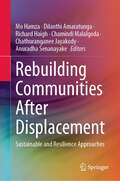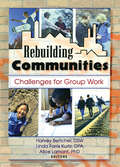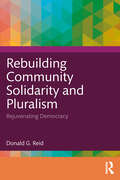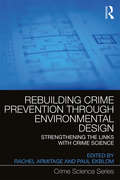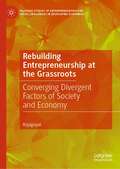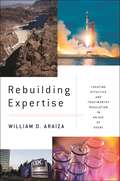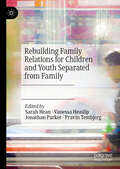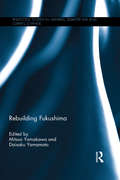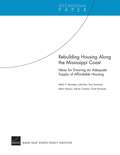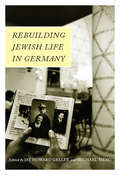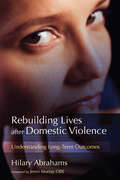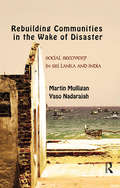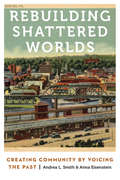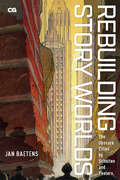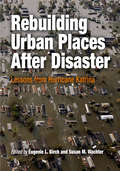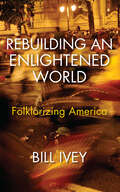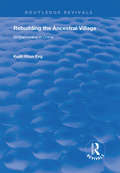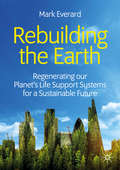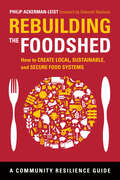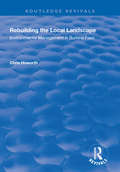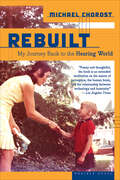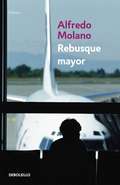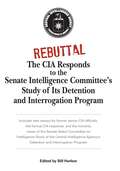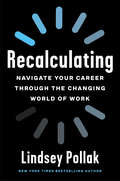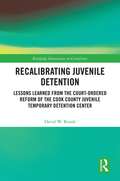- Table View
- List View
Rebuilding Communities After Displacement: Sustainable and Resilience Approaches
by Dilanthi Amaratunga Richard Haigh Mo Hamza Chamindi Malalgoda Chathuranganee Jayakody Anuradha SenanayakeThis book presents a collection of double-blind peer reviewed papers under the scope of sustainable and resilient approaches for rebuilding displaced and host communities. Forced displacement is a major development challenge, not only a humanitarian concern. A surge in violent conflict, as well as increasing levels of disaster risk and environmental degradation driven by climate change, has forced people to leave or flee their homes – both internally displaced as well as refugees. The rate of forced displacement befalling in different countries all over the world today is phenomenal, with an increasingly higher rate of the population being affected on daily basis than ever. These displacement situations are becoming increasingly protracted, many lasting over 5 years. Therefore, there is a need to develop more sustainable and resilient approaches to rebuild these displaced communities ensuring the long-term satisfaction of communities and enhancing the social cohesion between the displaced and host communities. Accordingly, chapters are arranged around five main themes of rebuilding communities after displacement.Response management for displaced communitiesThe Built environment in resettlement planningGovernance of displacementSocio-Economic interventions for sustainable resettlement
Rebuilding Communities: Challenges for Group Work
by Harvey Bertcher Alice E Lamont Linda Farris KurtzRebuilding Communities: Challenges for Group Work is a collection of research and information presented at the 18th Annual Symposium of the Association for the Advancement of Social Work with Groups. Social workers, students, educators, and practitioners will examine how group work can improve multicultural relations within the community. Through your use of the valuable suggestions in this book, you will discover new ways to help the poor in your community help themselves, while giving them a sense of power and self-esteem to help them battle racism, sexism, and shrinking economic opportunities. Through Rebuilding Communities, you will also discover a formula for global group work that will help you make a difference by applying your hometown skills to the global community. This valuable book discusses the need for you to combine energy with humility, offer assistance with the ability to listen, to intervene when necessary, and to comprehend diversity for successful and beneficial group programs. This informative guide brings to light the skills and values needed for effective group work and how combining knowledge-base and practice-base will assist you in making a positive impact on your community. With this important book, you will find a rich source of current thinking about group work practice in relation to women, violence, health problems, child welfare, and other areas, as well as group work theory to help you find the best way to help the various people of your community. Rebuilding Communities will provide you with specific ways to improve your group work skills and positively affect the individuals in your community, such as: learning that your role of caring and advocacy as a group worker must be a complete and lifelong commitment and that you must be prepared to use your skills throughout your everyday life to make a difference using the World Wide Web to form groups whose members can support one another through the anger, joy, pain, and challenges of life learning how group work can help calm the stormy transitions that adolescent immigrants face by helping them relate to other children who are in similar circumstances examining how parents of pediatric urology patients find solace through groups where they can address such sensitive issues as the future of sexual functioning and fertility for their children discovering how marathon group sessions in South Africa are helping to provide basic services to the disadvantaged with programs to facilitate interracial contact and understanding among women and programs for adolescents boys in foster careRebuilding Communities offers you a deeper understanding of the total positive effect that group work can have on various sectors of your community to help you provide better services to those in need. This unique book focuses your attention on the importance of group work to community development and even provides you with a glimpse into the future of group work. With Rebuilding Communities you will discover a multifaceted approach to solving problems that communities face to help you choose the best options for your own community and give the best possible services to the people you assist.
Rebuilding Community Solidarity and Pluralism: Rejuvenating Democracy
by Donald G. ReidThis book critiques the traditional practice of community organization, change and development, and concludes that the present practice of Community Development (CD) and Social Policy and Planning (SP&P) is no longer capable of meeting the current challenges at the local or national level. The aim of this book is to identify the underlying motivations for the individual aggressive and collective antisocial behaviour that we witness in democratic society today and offer changes to the orientation of the current community change practice in order to build a system that can better address the present needs of society.This work identifies the factors that are moving society toward extremism and authoritarianism focusing particularly on the community level. Given the turmoil in communities that is degrading democracy and leading to authoritarianism today, the issues of Community Solidarity and Pluralism (CS&P) must be attended to before the traditional political, economic, and material issues that are regularly addressed by CD and SP&P practice can become the focus for change and development once again. This book will have widespread appeal to academics, researchers, and postgraduate students throughout the social sciences including sociology, social work, political science, economics, philosophy, environmental studies, and international and community development studies. It is also intended for the general reader who is interested in understanding the authoritarian forces that are attempting to infiltrate the democratic process.
Rebuilding Crime Prevention Through Environmental Design: Strengthening the Links with Crime Science (Crime Science Series)
by Paul Ekblom Rachel ArmitageCrime Prevention Through Environmental Design (CPTED) is a practice-oriented approach to reduce the risk of offences such as burglary and fear of crime by modifying the built environment. In recent years, this approach has been criticised for duplicating terminology and for failing to integrate successfully with other approaches. Rebuilding Crime Prevention Through Environmental Design explores and extends the common ground between CPTED and situational crime prevention – another traditional approach in the field of crime prevention and security – via the latter’s evolution into the field of crime science. Drawing on international research to develop new interdisciplinary perspectives, this volume explores how situational crime prevention and environmental criminological theories relate to those of Crime Prevention Through Environmental Design and considers how crime science can be reformulated to merge different approaches, or at least articulate them better. Rebuilding Crime Prevention Through Environmental Design will appeal to students, applied academic researchers and practitioners who wish to deepen their understanding and contribute in turn to the ongoing revitalisation of the field.
Rebuilding Entrepreneurship at the Grassroots: Converging Divergent Factors of Society and Economy (Palgrave Studies of Entrepreneurship and Social Challenges in Developing Economies)
by RajagopalThis book analyzes the impact of entrepreneurship, technology, and innovation on meeting chronic and recurring social challenges, such as poverty, gender inequality, sustainability and climate change, income disparity, social healthcare, community housing and homelessness, and the drive to cleaner food and water supplies. It discusses inclusive entrepreneurial strategies to meet the above social challenges through transformational leadership in the developing economies.With case studies from Southeast Asia, Africa, and Latin America, the chapters highlight the success and failure of entrepreneurship in resolving the social challenges, arguing that effective convergence of strategies related to technology, innovation, and poverty alleviation influences entrepreneurial performance.Connecting different theoretical underpinnings and providing a number of frameworks, conceptual models, and cases, this work advances the conversation among entrepreneurship scholars on impacting the developing world.
Rebuilding Expertise: Creating Effective and Trustworthy Regulation in an Age of Doubt
by William D. AraizaWhy the public has lost faith in government and how it can be restored In 1964, over three-quarters of Americans trusted the federal government to do the right thing all or most of the time. By 1980, that number had plummeted to 26 percent, and Ronald Reagan won a sweeping victory for the presidency while proclaiming that government was not the solution to our problems but was itself the problem. Today, Americans’ trust in public institutions is at near historic lows and “bureaucracy” and “big government” are pejorative terms.In Rebuilding Expertise, William D. Araiza investigates the sources of this phenomenon and explains how we might rebuild trust in our public institutions. Written in accessible and engaging language, the author examines the history of this deterioration of trust and reveals how politicians from Clinton to Trump have allowed that deterioration to continue, and, in some cases, actively encouraged it. Using an interdisciplinary approach, with insights from history, political science, law, and public administration, Araiza explores our current bureaucratic malaise and presents a roadmap to finding our way out of it, toward a regime marked by effective, expert regulation that remains democratically accountable and politically legitimate. A timely and indispensable read, Rebuilding Expertise makes clear what steps must be taken to regain public trust in our government.
Rebuilding Family Relations for Children and Youth Separated from Family
by Jonathan Parker Vanessa Heaslip Sarah Hean Pravin TembjergThis edited volume explores a range of causes for separation of children and young people from family, the impact of these causes, and methods that both professionals and families may employ to build or rebuild these relations. In particular, contributions focus on six high priority crises through which children and young people become either permanently or temporarily separated from their families: removal by child welfare services, migration, family breakdown, placement into institutional care, incarceration and/or the death of a parent. Authors emphasize the feelings of grief and loss experienced both by the child and their family whatever the separation context and the eventual impact on the young person ´s mental health. They conclude that reunification with the family is not always possible or desirable and permanent alternative sources of care and/or attachment may be required. But if reunification is possible, it is a complex and a multidimensional pathway as children move from one care context to the next. Innovation, coproduction with the birth family and tackling stigma and discrimination associated with family separations, is a high priority.
Rebuilding Fukushima (Routledge Studies in Hazards, Disaster Risk and Climate Change)
by Mitsuo Yamakawa and Daisaku YamamotoFive years after the one of the worst nuclear accidents in history, Fukushima now only occasionally headlines national and international media. However, the disaster is far from over, as evidenced by a hundred thousand people from Fukushima still in the state of evacuation, rising levels of radiation in streams and rivers, and failing attempts to control the leakage of radioactive materials at the Fukushima Daiichi Nuclear Power Plant. Despite these dismal conditions, efforts to recover and rebuild livelihoods in the afflicted regions of Fukushima did start immediately after the outset of the accident. Rebuilding Fukushima gives an account of how citizens, local governments, and businesses responded to and coped with the crisis of Fukushima. It addresses principles to guide reconstruction and international policy environments in which the current disaster is situated. It explores how reconstruction is articulated and experienced at different spatial scales, ranging from individuals to communities and municipalities, and details recovery efforts, achievements, and challenges in the realms of public transportation, agriculture and food production, manufacturing industries, retail sectors, and renewable-energy industries. This book also critically investigates the nature of the current reconstruction policy schemes, and seeks to articulate what may be required in order to achieve more sustainable and equitable (re)development in afflicted regions and other nuclear host regions. Drawing on extensive fieldwork and local surveys, this volume is one of the first books in English that captures the knowledge and insights of native Japanese social scientists who dealt with the complexities of nuclear disaster on a day-to-day basis. It will be of great interest to students and scholars of disaster-management studies and nuclear policy.
Rebuilding Housing Along the Mississippi Coast
by Mark A. Bernstein Paul Sorensen Mark Hanson Julie Kim Adrian OvertonIn October 2005, RAND researchers went to Mississippi to help the Governor's Commission on Recovery, Rebuilding, and Renewal and the Affordable Housing Subcommittee of the Infrastructure Issues Committee. They identified policy and implementation options that could help local communities address affordable-housing issues. They considered challenges in providing affordable housing and strategies for dealing with those challenges.
Rebuilding Jewish Life in Germany
by Michael Meng Jay Howard GellerSeventy-five years after the Holocaust, 100,000 Jews live in Germany. Their community is diverse and vibrant, and their mere presence in Germany is symbolically important. In Rebuilding Jewish Life in Germany, scholars of German-Jewish history, literature, film, television, and sociology illuminate important aspects of Jewish life in Germany from 1949 to the present day. In West Germany, the development of representative bodies and research institutions reflected a desire to set down roots, despite criticism from Jewish leaders in Israel and the Diaspora. In communist East Germany, some leftist Jewish intellectuals played a prominent role in society, and their experience reflected the regime’s fraught relationship with Jewry. Since 1990, the growth of the Jewish community through immigration from the former Soviet Union and Israel have both brought heightened visibility in society and challenged preexisting notions of Jewish identity in the former “land of the perpetrators.”
Rebuilding Lives after Domestic Violence
by Hilary AbrahamsRebuilding Lives after Domestic Violence examines in-depth the long-term outcomes for women who have suffered domestic violence and abuse, based on interviews conducted over seven years. Through these interviews the author reveals the factors which help or hinder a successful transition from abusive relationship to independent living. The women interviewed provide an insight into the lengthy and difficult process of rebuilding their lives, and offer messages and advice to those working with women who have endured similar experiences. The author examines issues the women commonly face such as finding safe and independent accommodation, building practical and emotional support systems and relationships, and issues surrounding their children. She also discusses service provision and draws together the factors that contribute to a successful and independent life. This unique book will be essential reading for all those involved in working with women who have experienced domestic violence and abuse as well as those responsible for service provision and policy development.
Rebuilding Local Communities in the Wake of Disaster: Social Recovery in Sri Lanka and India
by Martin Mulligan Yaso NadarajahThis book examines the sociological consequences of disaster relief and recovery, and uncovers its impact on the communities that were affected by the Indian Ocean tsunami in 2004. It is the most extensive and intensive study of post-disaster community rebuilding yet reported in the literature on the subject. The authors draw on this research to develop a three-phase strategy for moving from quick and effective relief to long-term social recovery work. While there have been many big natural disasters since then, none have affected so many local communities spread over so many nations and none have evoked the same kind of global response. A great deal of post-tsunami recovery work was done in India and Sri Lanka, with more than 500 international aid and humanitarian agencies involved in Sri Lanka alone – many with little experience in long-term community development. This book argues that international aid agencies must work patiently to put in place meaningful partnerships with local, community-based organisations as soon as long-term physical and social planning becomes possible. The authors explain that such an approach could help address some pre-existing vulnerabilities in disaster-affected communities. They argue that it is much easier to rebuild damaged infrastructure than to rebuild shattered lives, and to ensure that traumatised communities are not put under new stresses and strains, the ‘fault-lines’ within these communities need to be lessened.
Rebuilding Shattered Worlds: Creating Community by Voicing the Past (Anthropology of Contemporary North America)
by Anna Eisenstein Andrea L. SmithRebuilding Shattered Worlds explores the ways a demolished neighborhood in Easton, Pennsylvania, still resonates in the imaginations of displaced residents. Drawing on six years of ethnographic research, the authors highlight the intersecting languages of blight, race, and place as elderly interlocutors attempt to make sense of the world they lost when urban renewal initiatives razed “Syrian Town”—a densely packed neighborhood of Lebanese American, Italian American, and African American residents. This ethnography of remembering shows how former residents engage collective memory-making through their shared place, language, and class position within the larger cityscape. Demonstrating the creative power of linguistic resources, material traces, and absent spaces, Rebuilding Shattered Worlds brings together insights from linguistic anthropology and material studies, foregrounding the role language plays in signaling “pastness.”
Rebuilding Story Worlds: The Obscure Cities by Schuiten and Peeters (Critical Graphics)
by Jan BaetensA collaboration between Belgian artist François Schuiten and French writer Benoît Peeters, The Obscure Cities is one of the few comics series to achieve massive popularity while remaining highly experimental in form and content. Set in a parallel world, full of architecturally distinctive city-states, The Obscure Cities also represents one of the most impressive pieces of world-building in any form of literature. Rebuilding Story Worlds offers the first full-length study of this seminal series, exploring both the artistic traditions from which it emerges and the innovative ways it plays with genre, gender, and urban space. Comics scholar Jan Baetens examines how Schuiten’s work as an architectural designer informs the series’ concerns with the preservation of historic buildings. He also includes an original interview with Peeters, which reveals how poststructuralist critical theory influenced their construction of a rhizomatic fictional world, one which has made space for fan contributions through the Alta Plana website. Synthesizing cutting-edge approaches from both literary and visual studies, Rebuilding Story Worlds will give readers a new appreciation for both the aesthetic ingenuity of The Obscure Cities and its nuanced conception of politics.
Rebuilding Urban Places After Disaster
by Eugenie L. Birch Susan M. WachterDisasters--natural ones, such as hurricanes, floods, or earthquakes, and unnatural ones such as terrorist attacks--are part of the American experience in the twenty-first century. The challenges of preparing for these events, withstanding their impact, and rebuilding communities afterward require strategic responses from different levels of government in partnership with the private sector and in accordance with the public will.Disasters have a disproportionate effect on urban places. Dense by definition, cities and their environs suffer great damage to their complex, interdependent social, environmental, and economic systems. Social and medical services collapse. Long-standing problems in educational access and quality become especially acute. Local economies cease to function. Cultural resources disappear. The plight of New Orleans and several smaller Gulf Coast cities exemplifies this phenomenon. This volume examines the rebuilding of cities and their environs after a disaster and focuses on four major issues: making cities less vulnerable to disaster, reestablishing economic viability, responding to the permanent needs of the displaced, and recreating a sense of place. Success in these areas requires that priorities be set cooperatively, and this goal poses significant challenges for rebuilding efforts in a democratic, market-based society. Who sets priorities and how? Can participatory decision-making be organized under conditions requiring focused, strategic choices? How do issues of race and class intersect with these priorities? Should the purpose of rebuilding be restoration or reformation? Contributors address these and other questions related to environmental conditions, economic imperatives, social welfare concerns, and issues of planning and design in light of the lessons to be drawn from Hurricane Katrina.
Rebuilding an Enlightened World: Folklorizing America
by Bill IveyToday, the long-assumed belief in the permanence of an enlightened world is suddenly open to challenge. Human rights, participatory government, and social justice are losing global influence, and the world of ordinary people is pushing back against Enlightenment conceits. Accumulated anger links Taliban, Tea Party, and Trump, threatening women's rights, social justice, and democracy. To understand and counteract the threat to these ideas, we must set aside embedded explanations and embrace a new frame of observation and tolerance grounded in the power of belief, legend, and tradition. In Rebuilding an Enlightened World, Bill Ivey explores how folklore offers a unique and compelling new way to understand the underlying forces disrupting the world today. If we are to salvage the best of the Enlightenment dream and build a better future, we must begin to listen, patiently and inquisitively, in order to interpret the customs, norms, and traditional practices that shape all human behavior.
Rebuilding the Ancestral Village: Singaporeans in China (Routledge Revivals #Monographs 5)
by Kung Eng KuahThis title was first published in 2000: This is a discussion of the relationship between one group of Singapore Chinese and their ancestral village in Fujian in China. It explores the various reasons why the Singapore Chinese continue to want to maintain ties with their ancestral village and how they go about reproducing Chinese culture (in the form of ancestor worship and religion) in the village milieu in China. It further explores the reasons why the Singapore Chinese feel morally obliged to assist their ancestral village in village reconstruction (providing financial contributions to infrastructure development such as the buildings of roads, bridges, schools, hospitals) and to help with small scale industrial and retail activities. Related to this is how the village cadres and teenagers, through various strategies, managed to encourage the Singapore Chinese to revisit their ancestral village and help with village reconstruction, thereby creating a moral economy. The main argument here concerns the desire of the Singapore Chinese to maintain a cultural identity and lineage continuity with their ancestral home. Ethnographically, this anthropological study examines two groups of Chinese separated by historical and geographical space, and their coming together to re-establish their cultural identity through various cultural and economic activities. At the theoretical level, it seeks to add a new dimension to the study of Chinese transnationalism and diaspora studies.
Rebuilding the Earth: Regenerating our planet’s life support systems for a sustainable future
by Mark EverardRebuilding the Earth highlights humanity’s interdependence with the planet’s ecosystems. Today, these ecosystems are seriously degraded, compromising future security and opportunity. It is essential that we set about rebuilding the metaphorical ‘ark’ of nature upon which our future prospects depend. Central to this book are several case studies of regenerative approaches drawn from every continent on the planet. These approaches are founded on restoration and protection of ecosystems – water and soil, forests, marine and coastal resources, urban infrastructure, farming practices and in corporate supply chains. Rebuilding the Earth is above all optimistic about the daunting challenges facing global society. It is about culture change, addressing the necessity of and the means for putting nature and people back into the heart of societal thinking, policy and action. It advocates for sustainable development in its deepest green sense, but also pragmatically framed in social, technological, governance and economic contexts. The concluding message is “Yes, we can!”
Rebuilding the Foodshed: How to Create Local, Sustainable, and Secure Food Systems
by Philip Ackerman-LeistDroves of people have turned to local food as a way to retreat from our broken industrial food system. From rural outposts to city streets, they are sowing, growing, selling, and eating food produced close to home—and they are crying out for agricultural reform. All this has made "local food" into everything from a movement buzzword to the newest darling of food trendsters.But now it's time to take the conversation to the next level. That's exactly what Philip Ackerman-Leist does in Rebuilding the Foodshed, in which he refocuses the local-food lens on the broad issue of rebuilding regional food systems that can replace the destructive aspects of industrial agriculture, meet food demands affordably and sustainably, and be resilient enough to endure potentially rough times ahead.Changing our foodscapes raises a host of questions. How far away is local? How do you decide the size and geography of a regional foodshed? How do you tackle tough issues that plague food systems large and small—issues like inefficient transportation, high energy demands, and rampant food waste? How do you grow what you need with minimum environmental impact? And how do you create a foodshed that's resilient enough if fuel grows scarce, weather gets more severe, and traditional supply chains are hampered?Showcasing some of the most promising, replicable models for growing, processing, and distributing sustainably grown food, this book points the reader toward the next stages of the food revolution. It also covers the full landscape of the burgeoning local-food movement, from rural to suburban to urban, and from backyard gardens to large-scale food enterprises.
Rebuilding the Local Landscape: Environmental Management in Burkina Faso (Routledge Revivals)
by Chris HoworthFirst published in 1999, this volume emerged in the context of a recent willingness to understand what Africa’s peasant farmers are designing and building in their local landscapes, in contrast to the meta-narratives which were relatively distant from the lives and livelihoods of Africans. Based on author Chris Howorth’s fieldwork as a UNAIS technical assistant, this book combines academic rigour with a commitment to participatory development action and encourages interaction between universities and field agencies for understanding the landscape. The first part of the book explores the efficiency of peasant modes of production. This is followed by culturally locating production patterns along with three village case studies in the province of Sissili: Lon, Boutiourou and Saboué. Building on ecological and farming systems research in these three villages, Howorth examines the case in Burkina Faso, analysing environmental land management strategies.
Rebuilt: My Journey Back to the Hearing World
by Michael ChorostAfter Michael Chorost suddenly lost what was left of his hearing, he took the radical step of having a cochlear implant -- a tiny computer -- installed in his head. A technological marvel, the device not only restored to him the world of sound but also could be routinely upgraded with new software. Despite his intitial fear of the technology's potentially dehumanizing effects, Chorost's implant allowed him to connect with others in surprising ways: as a cyborg, he learned about love, joined a writing group, and formed deeper friendships. More profoundly, his perception of the world around him was dramatically altered. Brimming with insight and written with charm and self-deprecating humor, Rebuilt unveils, in personal terms, the astounding possibilities of a new technological age.
Rebusque Mayor
by Alfredo Molano BravoHistorias de mulas y narcos que terminan pagando largas condenas en el exterior, relatadas con el inconfundible estilo de Alfredo Molano, Premio Simón Bolívar categoría Vida y Obra de un Periodista 2016. Historias sobre seres humanos comunes y corrientes que se ven envueltos en el problema del narcotráfico en Colombia. Por sus páginas desfilan siete personajes que, caminando por la cuerda floja de la vida, encontraron el autor que andaban buscando: jóvenes y viejos, ricos y pobres, pícaros y cándidos, hombres y mujeres de carne y hueso que en cierto momento de su trayectoria entraron en contacto con un fenómeno de implicaciones económicas, sociales, culturales y políticas inéditas en el país. La crítica ha dicho "En los testimonios que recoge y convierte en capítulos de libros o en libros enteros, nunca se llega a saber qué de lo publicado corresponde a la entrevista, qué a su autoría como sociólogo y qué a la ficción como literato". Myriam Bautista, El Espectador
Rebuttal
by Edited by Bill HarlowIn December 2014, the Senate Select Committee on Intelligence (SSCI) released a 500+ page executive summary of a 6,000 page study of the CIA's detention and interrogation of al Qa'ida terrorists. In early 2015 publishers released the study in book form and called it "the report" on "torture. " Rebuttal presents the "rest of the story. " In addition to reprinting the official responses from the SSCI minority and CIA, this publication also includes eight essays from senior former CIA officials who all are deeply knowledgeable about the program and yet none of whom were interviewed by the SSCI staff during the more than four years the report was in preparation. These authors of the eight essays are George Tenet, Porter Goss, Gen. Michael V. Hayden, USAF (Ret. ), John McLaughlin, Michael Morrell, J. Philip Mudd, John Rizzo, and Jose A. Rodriguez, Jr.
Recalculating: Navigate Your Career Through the Changing World of Work
by Lindsey PollakA leading workplace expert provides an inspirational, practical, and forward-looking career playbook for recent grads, career changers, and transitioning professionals looking to thrive in today’s rapidly evolving workplace.Covid-19 has heightened career uncertainty in a work landscape dominated by turbulence and change, and it is directly impacting how people are entering—or re-entering—the workplace. But as Lindsey Pollak makes clear, the pandemic merely accelerated career and hiring trends that have been building. Changes that were once slowly spreading have been rapidly implemented across all industries. This means that the old job hunting and career success rules no longer apply. Job seekers of all generations and skill sets must learn how to thrive in this “new normal,” which will include a hybrid of remote and in-person experiences, increased reliance on virtual communication and automation, constant disruption, and renewed employer emphasis on workers’ health and well-being.While this new world is complicated and constantly evolving, you won’t have to navigate it alone. For twenty years, Pollak has been following the trends and successfully advising young professionals and organizations on workplace success. Now, she guides you through the changes currently happening—and those to come. Combining insights from both experts and professionals across generations, she provides encouraging, strategic, and actionable advice on making lifelong decisions about education; building a resilient personal brand; using virtual communication to remotely interview, network, and work; skilling and reskilling for the future; and maintaining self-care and mental health.Like your personal GPS, Pollak equips you to handle workplace obstacles, helping you see them as challenges to navigate rather than impossible roadblocks. There is no perfect path to a dream career, but with Recalculating you’ll be prepared with the necessary skills and tools to succeed.
Recalibrating Juvenile Detention: Lessons Learned from the Court-Ordered Reform of the Cook County Juvenile Temporary Detention Center (Routledge Innovations in Corrections)
by David W. RoushRecalibrating Juvenile Detention chronicles the lessons learned from the 2007 to 2015 landmark US District Court-ordered reform of the Cook County Juvenile Temporary Detention Center (JTDC) in Illinois, following years of litigation by the ACLU about egregious and unconstitutional conditions of confinement. In addition to explaining the implications of the Court’s actions, the book includes an analysis of a major evaluation research report by the University of Chicago Crime Lab and explains for scholars, practitioners, administrators, policymakers, and advocates how and why this particular reform of conditions achieved successful outcomes when others failed. Maintaining that the Chicago Crime Lab findings are the "gold standard" evidence-based research (EBR) in pretrial detention, Roush holds that the observed "firsts" for juvenile detention may perhaps have the power to transform all custody practices. He shows that the findings validate a new model of institutional reform based on cognitive-behavioral programming (CBT), reveal statistically significant reductions in in-custody violence and recidivism, and demonstrate that at least one variation of short-term secure custody can influence positively certain life outcomes for Chicago’s highest-risk and most disadvantaged youth. With the Quarterly Journal of Economics imprimatur and endorsement by the President’s Council of Economic Advisors, the book is a reverse engineering of these once-in-a-lifetime events (recidivism reduction and EBR in pretrial detention) that explains the important and transformative implications for the future of juvenile justice practice. The book is essential reading for graduate students in juvenile justice, criminology, and corrections, as well as practitioners, judges, and policymakers.
